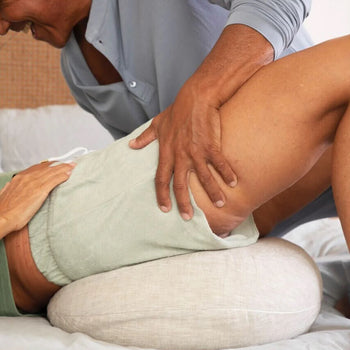Exhaustion during menopause is an overlooked menopause symptom. Yet, crashing fatigue is a symptom of peri/post/menopause that can be deeply frustrating and greatly impact your lifestyle. Crashing fatigue is understood as a type of exhaustion with a quick onset that significantly impacts your quality of life. This type of fatigue is debilitating and can be frustrating to try to solve on your own. In this article, we will dig into the reasons why menopause fatigue occurs, how it interacts with other menopausal symptoms, and what you can do to fight the exhaustion.
Symptoms of Menopause: Hot flashes, Night Sweats, and Fatigue
Perimenopause, the first phase of menopause, is the era when estrogen production begins to drop. This is the time when you'll start to notice irregular periods. As estrogen levels fluctuate, the body has a variety of responses. One of the most prominent responses to estrogen fluctuation are hot flashes. Lower estrogen levels trigger the hypothalamus. The hypothalamus is what regulates the body's temperature. When it is triggered, it often goes into overdrive to attempt to cool the body down even after a minor fluctuation of a degree or two of body heat. Thus, a hot flash occurs as the body tries to release excess heat. The nocturnal counterpart to hot flashes is night sweats. Night sweats are hot flashes that occur when asleep. Night sweats can make it difficult to get a good night's sleep, thus contributing to menopause insomnia.
Peri/post/menopause insomnia is the next piece in the puzzle of extreme fatigue during menopause. When estrogen production levels drop, the production of serotonin can also be affected. When serotonin is affected, mood swings can occur. These mood swings can include depression, which also can be characterized by feelings of fatigue. For some, they may begin experiencing anxiety that prohibits them from falling asleep at night, thus compounding the effects of menopause fatigue.
Menopause Fatigue during Perimenopause
Perimenopause happens at a different age for everyone, but there are some general guidelines that can help you determine if that's the phase you're currently in. Perimenopause occurs about four years before a woman experiences her final period. The average age of final period is 51, so that means many will begin to feel perimenopause symptoms around age 47. However, for those who experience early menopause, they will experience their last period at age 45 or younger, meaning perimenopause may kick in around age 40. Then, there's premature menopause, which is when a woman experiences their final period at age 40 or earlier. This means that perimenopausal symptoms will begin to kick in one's 30s.
If you're not sure if you're entering the menopausal transition, you can visit your women's health expert for more support. They can provide a blood test that can help provide clarity around the symptoms you're experiencing and if you are indeed experiencing perimenopause.
Ruling Out Other Fatigue-Related Health Concerns
While menopausal fatigue is a common issue many women face, it’s also important to keep in mind other health issues that can contribute to chronic fatigue. An underactive thyroid gland can lead to tiredness, constant fatigue, weight gain, and an overall low feeling. Adrenal fatigue and anemia are two other conditions that can lead to relentless fatigue. An appointment with your women's health specialist can help determine if menopause or other causes are leading to your fatigue.
Chronic fatigue syndrome is another cause of fatigue that can look similar to menopausal fatigue. Chronic fatigue syndrome has common symptoms that align with some of the aforementioned conditions, like extreme exhaustion, forgetfulness, lack of concentration. However, chronic fatigue syndrome has a side effect that differs from menopausal fatigue - joint pain. While you may experience joint pain during the menopause transition, joint pain is often due to entering the midlife years.
If you're experiencing mood changes alongside the fatigue, keep in mind that is yet another side effect of the evolution. However, if you're noticing it is difficult to get out of bed, you're experiencing a depressed mood, or even wavering between depression and anxiety, it never hurts to see a mental health professional. Many can provide Cognitive Behavioral Therapy (CBT), which can be extremely effective in managing menopause mood changes. If you still need more support, there’s no shame in exploring antidepressants.
Fighting Back Against Menopausal Fatigue
Here's the good news: You have options for getting your energy levels back. If you're certain you're experiencing menopausal fatigue, natural supplements and lifestyle changes can help you find your groove once again. First, let's talk about supplements. You may want to try our Energy Boosting Dietary Supplement. Our Sleep Enhancing Dietary Supplement tackles disrupted sleeping and night sweats thanks to powerhouse plant ingredients like natural sleep support Melatonin, brain nourishing Ashwagandha, and immune support Pycnogenol®. Folks report less night sweats and better sleep after just 60 days of use. Give it a try.
Regular exercise can be a big help when it comes to fighting menopausal fatigue. Not only does exercise boost your levels of serotonin and overall energy, it is great for strengthening your bones and maintaining a healthy weight, all of which are key considerations during the midlife transition. Sleep hygiene is another key when it comes to managing sleep problems. This means it is important to develop a strong nighttime routine that includes avoiding caffeine, smart phones, and even television within a couple hours of bed time.
Hormone replacement therapy (HRT) is often suggested as a remedy for hormonal changes. It is worth noting that HRT isn't an option for everyone and it can be rather challenging on the body. It has even been linked to breast cancer - so we suggest taking a more holistic approach to leveling those hormone levels and combatting menopausal fatigue with some of the safer solutions we've outlined already.
Our Promise to You...
You don't have to go it alone. Kindra believes community is at the center of the menopausal evolution. We created a Facebook group for women experiencing this transition to gather, commune, and grow with one another. No topic is too taboo in this space of support. Join us!
Sources:
https://www.healthline.com/health/menopause/menopause-fatigue
https://www.everydayhealth.com/hs/guide-to-managing-menopause
https://palmettobella.com/2016/06/01
https://www.nhs.uk/conditions/early-menopause/
NOTICE: KINDRA DOES NOT PROVIDE MEDICAL OR HEALTH CARE ADVICE. OUR EMPLOYEES AND OTHER REPRESENTATIVES ARE NOT PHYSICIANS OR HEALTH CARE CLINICIANS. YOU SHOULD CONSULT YOUR PERSONAL PHYSICIAN FOR ANY MEDICAL AND/OR OTHER HEALTH CARE ADVICE BEFORE ACTING ON ANY INFORMATION PROVIDED BY KINDRA OR ANY OTHER SOURCE
Leave a Reply
Tags: About Menopause Fatigue Foggy & Unfocused Hot flashes Mental Well-Being mind Moody & Irritable Physical Well-Being Weight Gain
















